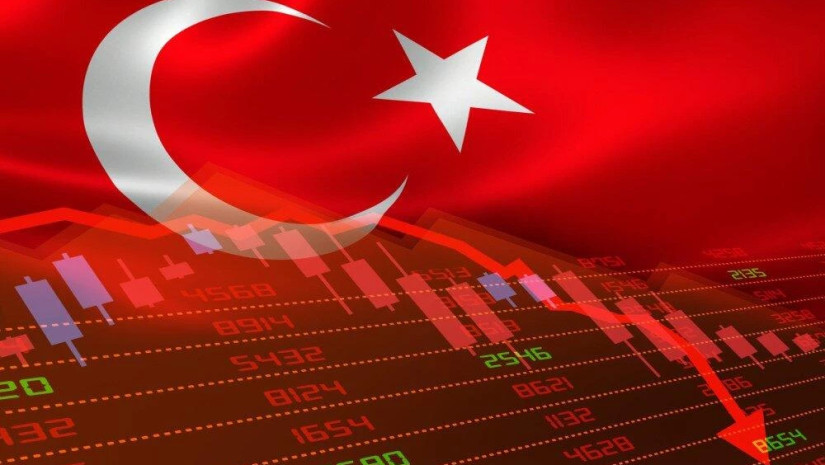Türkiye’s economy, projected to have expanded by more than 5% in 2022 according to surveys, is robust but is somewhat weaker in terms of growth versus previous years, driven mainly by a slowdown in demand.
The economy is cooling further this year, mainly due to devastating earthquakes that flattened a swathe of Türkiye’s southeastern region in early February, which could keep pressure on inflation and stretch the government’s budget.
The economy lost momentum but remained buoyant in the second part of 2022 as a global slowdown dragged exports. However, the vital tourism sector helped Türkiye maintain one of the best performances among G-20 countries.
The gross domestic product (GDP) expanded by 3.9% year-over-year in the third quarter, as both domestic and foreign demand eased, partly due to a slowdown in the main trading partners that hurt exports because of the Russia-Ukraine war.
It had bounced back strongly from the COVID-19 pandemic and grew 7.5% in the first quarter and 7.7% in the second, extending its hot streak of strong domestic demand and exports.
The data, due to be released on Tuesday, is expected to show that the GDP expanded by 5.2% in 2022, according to surveys by Reuters and Anadolu Agency (AA).
Estimates in the Reuters poll of 16 economists for 2022 GDP growth ranged between 5% and 6.2%. The poll also put change in the fourth quarter at 3%, and according to the median estimate, between 2.3% and 6.3%.
Expectations of 13 economists in the AA survey hovered between 5% and 5.4% for the year, and 2.2% and 4% for the last quarter.
“Recent short-term trends in sectors of economic activity indicate that either decelerating or falling dynamics prevailed at the end of 2022,” said Eurobank, noting weakening exports and the fading benefits of lira devaluation for industry sector production volume at the end of 2022.
Türkiye’s central bank embarked on a 500-basis-point easing cycle last year to counter the slowdown.
The government has prioritized low-interest rates to boost exports, production, and investment and create new jobs as part of a new economic program. Dubbed the Türkiye Economy Model, the program aims to lower inflation by flipping the country’s chronic current account deficit to a surplus.
Earthquake impact
Last week, the central bank cut its policy rate by another 50 basis points to support growth in the aftermath of the massive earthquakes that killed more than 44,200 people in southern Türkiye.
The magnitude 7.7 and 7.6 quakes struck on Feb. 6 and destroyed around 164,000 buildings, containing some 520,000 apartments, in 11 provinces affected by what is described as the worst disaster in Türkiye’s modern history.
The GDP growth in 2023 is expected to be 2.8%, based on the median estimate in the Reuters poll. Predictions ranged from 1.2% to 3.9%. In a previous survey conducted in January, the median estimate for 2023 economic growth stood at 3% before the earthquake.
Nine economists in the AA survey predicted that the economy would grow by 3.3% in 2023.
Business groups and economists have said rebuilding could cost Türkiye up to $100 billion and shave one to two percentage points off growth this year. Wall Street bank JPMorgan estimated the quake’s direct damage to buildings and infrastructure to be $25 billion.
“The Turkish economy will be affected by the strong earthquakes ... On the other hand, due to this adverse event, extensive packages of support measures will be taken, giving a boost to the quake-hit regions and the overall economy,” Eurobank said.
Pressure on inflation, budget
A surge in prices of goods and services, including food and housing, due to disruptions caused by the quakes could keep pressure on the inflation rate, which may fall in coming months by less than expected, according to economists.
The consumer price index (CPI) dropped to around 58% in January, down from the peak of 85.5% – a 24-year high – registered last October.
Inflation had been expected to keep falling to around 35-40% by June, but due to the earthquake, it could remain above 40% heading into presidential and parliamentary elections.
More than two million people are estimated to have left the southeastern region, which accounted for close to 10% of GDP and about 16% of Türkiye’s agricultural production last year, which could drive food inflation higher.
The area accounted for 8.5% of Türkiye’s exports and 6.7% of imports. However, economists say the quakes are unlikely to affect Türkiye’s trade balance as exports and imports are expected to drop.
The quake also gives the government an additional challenge on the budget, one of the most substantial areas of the economy. Economists had estimated that the budget deficit to GDP ratio for 2023 would be around 3.5% before the earthquakes, but predictions are now rising towards 5%.
JPMorgan revised its budget deficit forecast to 4.5% of GDP for 2023 from a previous 3.5%, drawing attention to increased spending due to the earthquake, Daily Sabah reports.
















